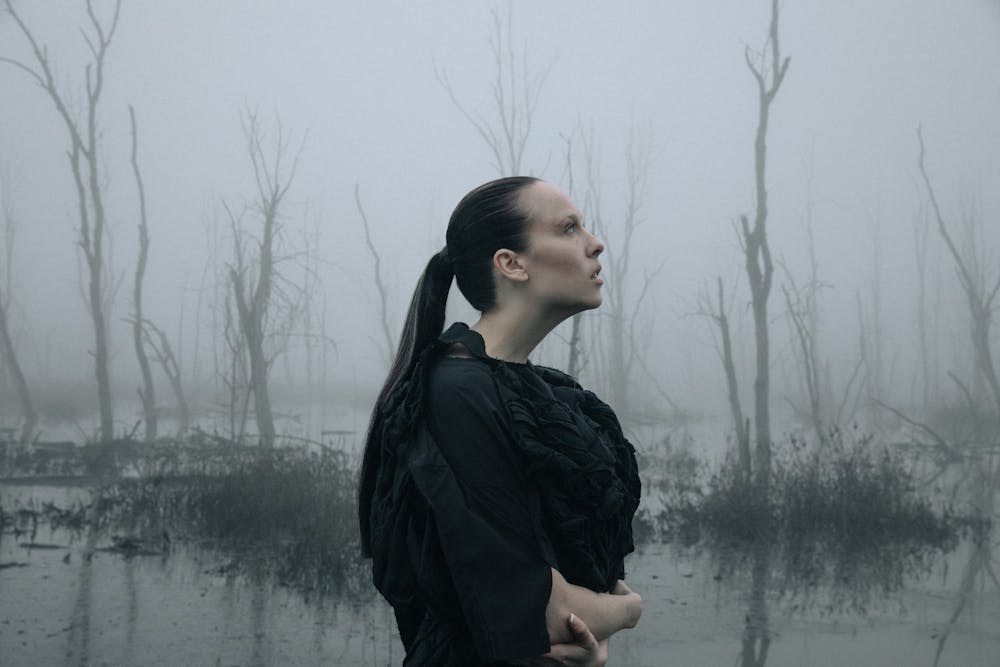Allie X's vision of pop has always been difficult to pin down. Since her popularity exploded in 2015, her image has been guided by macabre, dark aesthetics. Yet, the actual music she makes is much brighter; her electropop sound shimmers with addictive hooks and sparkling synthesizers. "Catch," her breakout song and lead single off of her debut EP, CollXtion I, showcases this contrast spectacularly. Punchy drums and 80s–inspired synths create a dazzling backdrop for Allie X to deliver one of the best hooks of the 2010s: "Just wait until I catch my breath," she sings, pausing to gasp between the words "my" and "breath." That tiny break, that teeny little sixteenth–rest, feels monumental, cavernous, infinite. It makes you tense up and lean in just before the beat kicks back in to dissolve all the built–up tension.
Watching the music video, however, brings all that suspense back. In stuttering, horror movie–esque shots, Allie X sings from a variety of gruesomely intimate positions: lying nude in a pile of mannequins, levitating off the ground while stabbed in the chest with needles, in the middle of an operation where her organs are replaced by plastic ones. It's pretty creepy—a sucker punch which leaves us gasping for air, too. "I’m naturally a macabre kind of person," Allie explained to me, early in our conversation. "It’s not that I love the grotesque, it’s just that I love playing with juxtaposition. I love contrast in art. I love seeing something that is both grotesque and beautiful at the same time."
On Cape God, her latest album, she deploys all of her morbid sensibilities in a more realistic setting. In the past, Allie described the album as being based on a documentary called Heroin: Cape Cod, USA. When I asked her to elaborate on the concept, she expressed that she "[wants] to be careful" with that description. She continued, "I’ve become aware, recently, that it can come across like I’m appropriating a problem that I haven’t experienced myself... I don't want to come across as an ignorant asshole." As our discussion goes on, she clarifies the concept isn't necessarily guided by a literal examination of the Opioid Crisis, but rather, "how the characters in the documentary felt: detached, desperate, ashamed, and living day–to–day."
This emotional palette shapes the sound and narrative of Cape God. Many of the songs are sung from Allie's own experiences with pain, rejection, and isolation as a teenager. Cape God is a deeply personal album, constantly oscillating between twistedly dark and morbidly beautiful. Everything you expect from an Allie X project is present—bombastic pop production, gorgeous vocals, catchy hooks—but the extra layer of lurid realism always lurks in the background.
Album opener "Fresh Laundry" immediately sets the tone for this uneasy darkness. The song is markedly downtempo, with a simmering, throbbing bassline for ambiance. After watching the aforementioned documentary, Allie took a trip to Sweden to work with Oscar Gorres and James Ghaleb, the two primary collaborators for the album. "Without even telling Oscar and James, that’s kind of where I was writing from, " she said. "I sort of had this landscape of this East Coast place in mind—I didn’t actually call it Cape God until a few months later...[I was writing about] someone who wanted to go home, but couldn't, someone who decided to be a certain way, and who was now grappling with that and living with that. And that was my own experience."
Cape God, a play on Cape Cod, isn't the first Allie X record to be guided by a physical place. Her previous EP, Super Sunset, centers around Allie's experience living in LA. As it turns out, these two projects are related. "Originally, I started writing Cape God before I even released the first song from Super Sunset. I started thinking of them as sister records, which would both be EPs, and eventually be released as one big record. One as Side A, one as Side B," she said. "But then, as I wrote Cape God, it really just took on a life of itself. It needed to be a full length album, and it no longer felt like a sister record. I was thinking about the West Coast record, about my present story, and the East Coast story of my past."
As we discuss all the pop innovations that melded the music industry in the past decade, Allie believes honesty is what drives quality in pop. "When someone tells me that it’s honest work: that’s kind of the highest compliment to me. When pop music can be really honest, well, that’s something that I really strive for." Her emphasis on vulnerability rings true through the entirety of Cape God. Just below the gleaming sheen of electropop lies the story of a woman grappling with what's become the new norm: isolation, uncertainty, and anxiety.

